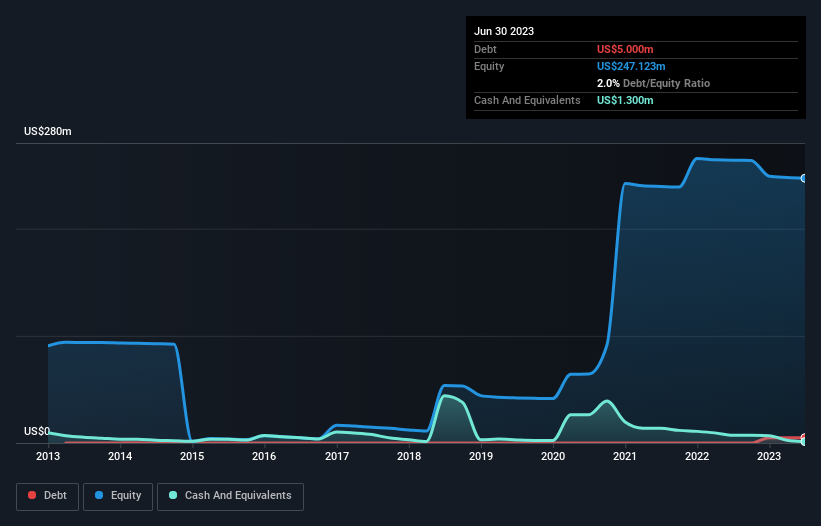
Some say volatility, rather than debt, is the best way to think about risk as an investor, but Warren Buffett famously said that 'Volatility is far from synonymous with risk.' So it might be obvious that you need to consider debt, when you think about how risky any given stock is, because too much debt can sink a company. Importantly, Africa Energy Corp. (CVE:AFE) does carry debt. But the more important question is: how much risk is that debt creating?
When Is Debt Dangerous?
Debt is a tool to help businesses grow, but if a business is incapable of paying off its lenders, then it exists at their mercy. If things get really bad, the lenders can take control of the business. However, a more common (but still painful) scenario is that it has to raise new equity capital at a low price, thus permanently diluting shareholders. Having said that, the most common situation is where a company manages its debt reasonably well - and to its own advantage. When we examine debt levels, we first consider both cash and debt levels, together.
See our latest analysis for Africa Energy
How Much Debt Does Africa Energy Carry?
The image below, which you can click on for greater detail, shows that at June 2023 Africa Energy had debt of US$5.00m, up from none in one year. However, because it has a cash reserve of US$1.30m, its net debt is less, at about US$3.70m.

How Healthy Is Africa Energy's Balance Sheet?
Zooming in on the latest balance sheet data, we can see that Africa Energy had liabilities of US$5.44m due within 12 months and no liabilities due beyond that. Offsetting this, it had US$1.30m in cash and US$51.0k in receivables that were due within 12 months. So its liabilities total US$4.09m more than the combination of its cash and short-term receivables.
Of course, Africa Energy has a market capitalization of US$102.3m, so these liabilities are probably manageable. However, we do think it is worth keeping an eye on its balance sheet strength, as it may change over time. There's no doubt that we learn most about debt from the balance sheet. But ultimately the future profitability of the business will decide if Africa Energy can strengthen its balance sheet over time. So if you want to see what the professionals think, you might find this free report on analyst profit forecasts to be interesting.
Since Africa Energy doesn't have significant operating revenue, shareholders must hope it'll sell some fossil fuels, before it runs out of money.
Caveat Emptor
Over the last twelve months Africa Energy produced an earnings before interest and tax (EBIT) loss. Its EBIT loss was a whopping US$20m. When we look at that and recall the liabilities on its balance sheet, relative to cash, it seems unwise to us for the company to have any debt. So we think its balance sheet is a little strained, though not beyond repair. Another cause for caution is that is bled US$11m in negative free cash flow over the last twelve months. So in short it's a really risky stock. When analysing debt levels, the balance sheet is the obvious place to start. But ultimately, every company can contain risks that exist outside of the balance sheet. For example Africa Energy has 3 warning signs (and 2 which are potentially serious) we think you should know about.
If, after all that, you're more interested in a fast growing company with a rock-solid balance sheet, then check out our list of net cash growth stocks without delay.
New: Manage All Your Stock Portfolios in One Place
We've created the ultimate portfolio companion for stock investors, and it's free.
• Connect an unlimited number of Portfolios and see your total in one currency
• Be alerted to new Warning Signs or Risks via email or mobile
• Track the Fair Value of your stocks
Have feedback on this article? Concerned about the content? Get in touch with us directly. Alternatively, email editorial-team (at) simplywallst.com.
This article by Simply Wall St is general in nature. We provide commentary based on historical data and analyst forecasts only using an unbiased methodology and our articles are not intended to be financial advice. It does not constitute a recommendation to buy or sell any stock, and does not take account of your objectives, or your financial situation. We aim to bring you long-term focused analysis driven by fundamental data. Note that our analysis may not factor in the latest price-sensitive company announcements or qualitative material. Simply Wall St has no position in any stocks mentioned.
About TSXV:AFE
Africa Energy
Operates as an oil and gas exploration company in South Africa.
Adequate balance sheet with moderate growth potential.
Market Insights
Community Narratives



